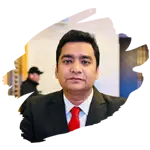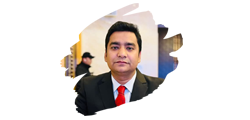Outline of state structure repair
(Democratic reform of the constitution and state system, enacted with the aim of economic liberation)
The people of Bangladesh, with the dream of establishing democracy, equality, human dignity, and social justice, built a state through the great liberation war at the cost of a sea of blood, is no longer in their hands today. The current authoritarian government has destroyed and shattered the structure of the Bangladesh state. This state must be repaired and reconstructed. In order to return the ownership of the country to the people, after winning a free, fair, impartial, acceptable, and participatory election, a “government of public welfare national consensus” will be established by the political parties participating in the movement to overthrow the current fascist government.
The said "National Government" will undertake the following state transformational reform activities:
The Awami League government, which has been in power for more than a decade, has brought many unreasonable fundamental constitutional amendments with the nefarious aim of consolidating power. A “Constitutional Reform Commission” will be formed to review all controversial and undemocratic constitutional amendments and changes, repeal/amend them and make other essential constitutional reforms. The democratic rights of the people will be re-established by reintroducing the referendum system in the constitution.
An inclusive, non-discriminatory and harmonious “Rainbow Nation” will be established on the basis of Bangladeshi nationalism, in contrast to the politics of revenge and revenge, by combining all views and paths. For this, a new type of future-oriented social contract will have to be reached on the basis of continuous discussion, exchange of views and mutual understanding. For this, a “National Reconciliation Commission” will be formed.
An "election-time, party-neutral caretaker government" system will be introduced to re-establish democracy and voting rights in Bangladesh and to give a permanent constitutional and institutional form to the transparent democratic process.
The executive power of the government, the Prime Minister and the Council of Ministers, will be balanced. The powers, responsibilities and duties of the executive, legislative and judicial branches will be coordinated in order to establish checks and balances in state power.
No one will be able to serve as Prime Minister for more than two consecutive terms.
In addition to the existing parliamentary system, an "Upper House of the Legislature" will be introduced in the parliament, consisting of prominent citizens of the country, renowned academicians, professionals, political scientists, sociologists, and people with administrative experience, with the aim of running the state with a combination of expert knowledge.
The issue of amending Article 70 of the Constitution will be considered subject to examination and scrutiny in order to ensure the opportunity for members of Parliament to freely express their opinions on all matters other than trust votes, money bills, constitutional amendment bills and matters involving national security.
The current “Chief Election Commissioner and Other Election Commissioners Appointment Act, 2022” will be amended to form an effective Election Commission consisting of independent, skilled, impartial, acceptable and determined individuals based on the opinions of political parties and eminent persons. Voting will be ensured through paper ballots at all centers, not EVMs. The RPO, Delimitation Order and Political Party Registration Act will be reformed. The use of party symbols in local government elections will be abolished.
All these institutions will be restructured through legal reforms with the aim of re-establishing transparency, accountability and credibility in all state, constitutional and statutory institutions, rising above narrow political party affiliation. Appointments to constitutional and important positions in all these institutions will be made subject to the vetting of parliamentary committees through hearings.
In the light of the Constitution of Bangladesh and the verdict of the Masdar Hossain case, the effective independence of the judiciary will be ensured. A “Judicial Commission” will be formed to reform the current judicial system. The control and discipline of the subordinate courts will be vested in the Supreme Court. There will be a separate secretariat for the judiciary under the control of the Supreme Court. The “Supreme Judicial Council” system mentioned in the Constitution will be reintroduced for the impeachment of Supreme Court judges. For this, necessary amendments will be made to the Constitution. Judges will be appointed only after rising above party considerations and examining them only on the strict criteria of knowledge, wisdom, ethics, judgment and reputation. For the purpose of appointing Supreme Court judges, a “Judicial Appointment Act” will be formulated with specific qualifications and criteria as per Article 95(2)(c) of the Constitution.
With the aim of building a patriotic service, public administration and police administration, an "Administrative Reform Commission" consisting of qualified, experienced and knowledgeable individuals will be formed to reform and restructure the administration. Merit, integrity, creativity, skill, experience and training will be considered as the sole criteria of eligibility for appointment, transfer and promotion in civil and military administration.
In order to ensure complete freedom of the media and carry out overall reforms, a “Media Commission” will be formed comprising former Supreme Court judges, media professionals and knowledgeable, experienced and acceptable media persons. Necessary steps will be taken to restore the environment of honest and independent journalism. For this purpose, necessary amendments will be made to the ICT Act- 2006, the Anti-Terrorism Act- 2009 and all the old laws that take away basic human rights including the Special Power Act- 1974, the Digital Security Act- 2018 will be repealed. All journalist torture and murders, including the sensational Sagar-Runi murder, will be brought to justice.
There will be no compromise on corruption. A white paper will be published after investigating the money laundering and corruption that has taken place over the past decade and a half and legal action will be taken against the responsible persons identified in the white paper. Necessary administrative and legal measures will be taken to bring back the money laundered outside the country. Transparency and accountability of the “ACC” will be ensured through systematic reforms, along with the reform of the Anti-Corruption Commission and the Anti-Corruption Act. An “Ombudsman” will be appointed in accordance with the constitution.
The rule of law will be established at all levels. Human values and human dignity will be re-established and disappearances, murders, extrajudicial killings and inhuman, cruel physical and mental torture will be ended. Human rights will be implemented in accordance with the Universal Declaration of Human Rights. Appointments will be made to the Human Rights Commission based on specific criteria. All extrajudicial killings, arbitrary killings in the name of crossfire, disappearances, murders, abductions, rapes, cruel physical torture and cruel and inhuman crimes committed over the past decade and a half will be ensured fair justice according to the prevailing law.
In order to ensure economic justice, an “Economic Reform Commission” will be formed consisting of expert economists and researchers, experienced bankers, corporate leaders, and people with administrative experience. The main motto of the Liberation War is equality, human dignity, and social justice, and the inequality between the rich and the poor will be eliminated through equitable distribution of the benefits of growth. The above-mentioned Constitutional Reform Commission, Administrative Reform Commission, Judicial Commission, Media Commission, and Economic Reform Commission will submit their reports within a specific time frame so that the relevant recommendations can be implemented quickly.
Based on the principle of "religion to each, state to all", every religious person shall enjoy the full right to practice his or her religion. All ethnic groups, large and small, in the hills and plains, irrespective of party, creed, religion or caste, shall be provided with full social, political, cultural, economic and religious rights, civil rights and full security of life, honor and property as provided for in the constitution. Action shall be taken against those responsible for vandalizing the homes, businesses and places of worship of religious and ethnic minorities and seizing their property.
Fair wages for workers (Price-index based) will be ensured in the light of inflation. Child labor will be stopped and an environment and system suitable for their development will be ensured. Safe working environment and democratic trade union rights will be ensured. Initiatives will be taken to reopen all closed industries including jute mills, textile mills, sugar mills. Arrangements will be made to ensure the life, dignity and work security of expatriate workers and harassment-free service and voting rights in all areas including airports in the country. Special programs will be adopted and implemented to eliminate inequality and achieve balanced development in tea gardens, slums, char areas, haor-baor and mango-affected and coastal areas.
All black laws including the immunity law will be repealed in the power, energy and mineral sectors and the ongoing corruption in purchasing power from quick rental power plants that are against the public interest will be stopped in order to prevent hemorrhage in the national economy. Appropriate measures will be taken to avoid import dependence and to generate renewable and mixed energy-based power and to discover and extract neglected gas and mineral resources. Investment-friendly policies will be adopted to attract domestic and foreign investment in the development of the industrial sector. Encouragement, opportunities and incentives will be given to expatriate Bangladeshis for investment. A comprehensive industrial infrastructure will be built nationwide in a planned manner.
In all areas of foreign relations, Bangladesh's national interests, national sovereignty and national security will be given the highest priority. Bilateral and multilateral problems will be resolved in accordance with equality, fairness, recognition of mutual interests and recognized international rules and regulations. No terrorist activity will be tolerated within the territory of Bangladesh and no terrorist activity will be sheltered. Strict measures will be taken against terrorism, militancy and extremism. If the mischievous attempt to suppress dissenting forces and political opposition parties by using terrorism as a political shield or tool and labeling it as terrorism is stopped through the misuse of the anti-terrorism law, it will be possible to identify the real terrorists and bring them under the law and punish them.
To protect the sovereignty of the country, the defense forces will be well-organized, up-to-date and inspired by the highest patriotism. The defense forces will be kept above all controversies while maintaining their own dignity.
With the aim of comprehensive decentralization of power, local government institutions will be made more independent, strong and empowered. All these institutions will be brought under accountability in such a way that they can play an effective role in providing various services and development activities including education, health. An independent local government will be ensured, free from the influence of local administration and any other public representative. No government administrator will be appointed in a local government institution unless the position is vacant due to death or by court order. Elected representatives of local government will not be suspended/dismissed/removed by executive order unless convicted by a court.
Arrangements will be made to provide state recognition to each person for their contribution to the war of independence in 1971. A list of martyrs in the war of liberation will be prepared on the basis of an intensive survey at the state initiative and they will be given appropriate state status and recognition. Based on this list, policies will be formulated and implemented for the welfare of the families of martyred freedom fighters. An accurate list will be prepared after verifying the list of freedom fighters.
A modern and up-to-date youth development policy will be formulated, taking into account the vision, thoughts and aspirations of the youth. Unemployment allowance will be provided to the educated unemployed for a period of one year or until employment is obtained, whichever is earlier. Multifaceted realistic programs will be taken to eliminate unemployment. Visible steps will be taken to realize the “demographic dividend” by increasing the skills of the youth. Necessary investments will be made in human resource development, giving utmost importance to health, education and nutrition. Consideration will be given to increasing the age limit for entry into government service as per international standards.
Specific programs will be taken for women's empowerment with the aim of ensuring effective participation of women in the national development process. Timely development plans will be formulated and implemented to improve the quality of life of women and children. Women will be given priority in principle in nominations to the National Parliament. Initiatives will be taken to increase women's representation in the local government system.
The current anarchy in the education sector will be eliminated and priority will be given to need-based education at the lower and middle levels and knowledge-based education in higher education. Special importance will be given to research. Priority will be given to equal quality education and education in the mother tongue. Arrangements will be made for regular student council elections in educational institutions to develop future leaders. With the aim of developing a competent, skilled and humane population, 51.3 trillion of GDP will be allocated in the national budget for the education sector. Budget allocations to public interest sectors such as education and health will be gradually increased in line with economic growth.
All relevant sectors including education, technology and training will be streamlined to create skilled human resources. Research and Development (R&D) will be given top priority in education, industry, science and technology and production sectors. Appropriate measures will be taken for the development of sports and national culture. Immoral sky culture and cultural aggression will be prevented.
Considering health as an asset, based on the principles of "health for all" and "no death without treatment", universal health coverage will be introduced on the model of the UK's "NHS" and a health card will be introduced for all. 5% of GDP will be allocated in the national budget for the health sector. The social safety net will be further expanded for the deprived and extremely poor groups until poverty is eradicated.
Fair prices for agricultural products will be ensured. Government procurement centers for agricultural products will be established in all unions in phases. Crop insurance, animal insurance, fisheries insurance and poultry insurance will be introduced, even if subsidies are provided if necessary. Non-agricultural use of agricultural land will be discouraged. Effective steps will be taken to formulate and implement action plans on a priority basis for the development and research of the agriculture, fisheries and livestock sectors. Incentives will be given to the relevant export-oriented agro-processing industry sector.
To develop the country's communication infrastructure, a comprehensive multi-dimensional communication system will be built throughout the country by making necessary reforms in roads, railways and waterways. Arrangements will be made to increase regional and international trade through the modernization, development and efficiency enhancement of the country's seaports and waterways.
Sustainable and effective measures will be taken to deal with the crisis and damage caused by climate change. Institutional capacity will be increased by collecting the latest equipment to deal with natural disasters such as floods, tidal waves, cyclones and earthquakes. Effective measures will be taken to prevent pollution of rivers and water bodies and canal and river excavation-re-excavation programs will be implemented to prevent floods and droughts. Measures will be taken to extract and economically utilize marine resources based on scientific surveys and reserves.
Necessary steps will be taken to upgrade the information and communication technology sector to global standards and its application in all fields will be given priority. The institutional and practical scope of the activities of the Space Research and Atomic Energy Commission will be enriched.
By formulating a national master plan, policies for planned housing and urbanization will be adopted and implemented without wasting agricultural land in cities and villages and by reducing the increasing pressure of population in cities. Housing will be ensured for all poor groups of the country in phases.



